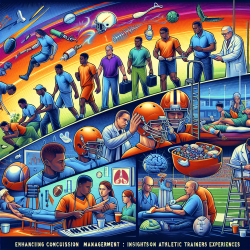The management of concussions in sports is a critical aspect of ensuring the safety and well-being of athletes, particularly in high school settings where young athletes are still developing. Recent research conducted by Dr. James Stavitz explores the experiences and perceptions of athletic trainers (ATCs) regarding a multifaceted approach to concussion management. This blog post delves into the findings of this study and offers practical insights for practitioners seeking to enhance their skills and improve concussion management protocols.
The Importance of a Multifaceted Approach
A multifaceted approach to concussion management involves using multiple measures to assess trauma severity and determine return-to-play (RTP) status. This comprehensive strategy includes clinical evaluations, symptom checklists, neurocognitive assessments, and balance assessments. The research highlights that no two concussions are identical; therefore, a standardized protocol is essential for accurate assessment and safe RTP decisions.
Lack of Standardization
The study reveals significant variations in how athletic trainers implement concussion protocols due to a lack of standardization. While some states provide guidelines, there is no universal mandate for a specific RTP protocol. This inconsistency can lead to varying assessment, referral, and RTP experiences among athletes.
Referral Challenges
Athletic trainers often face challenges when referring athletes to physicians for concussion evaluation. The ability to refer to trusted and responsive specialists greatly influences the satisfaction with referral experiences. However, barriers such as insurance limitations and parental preferences can complicate the process.
Pressures and Barriers in Concussion Management
Pressure from Coaches, Parents, and Students
Athletic trainers frequently encounter pressure from coaches, parents, and students to expedite the RTP process. This pressure can compromise the thoroughness of concussion assessments and potentially endanger athlete safety. The study emphasizes the need for clear communication and education to manage these expectations effectively.
Barriers from Unqualified Physicians
The research identifies a significant barrier in the form of clearances issued by unqualified physicians. Some athletes are prematurely cleared for RTP by doctors lacking expertise in concussion management. This issue underscores the importance of educating parents about appropriate assessment practices and advocating for access to qualified specialists.
The Benefits of Increased Knowledge and Awareness
A key finding from the study is that implementing a multifaceted approach enhances athletic trainers' knowledge and awareness of concussions. This increased understanding leads to more effective care for student-athletes. By staying informed about best practices and advancements in concussion management, ATCs can provide better patient care and ensure safer RTP decisions.
Implications for Practice
The study highlights the need for ongoing education and training for athletic trainers to address the challenges identified. Developing standardized protocols and fostering collaboration between schools, healthcare providers, and parents can improve concussion management outcomes. Practitioners should also advocate for policies that prioritize athlete safety over external pressures.
Conclusion
The experiences shared by athletic trainers in this study offer valuable insights into improving concussion management practices. By embracing a multifaceted approach, practitioners can enhance their skills, provide better care for athletes, and contribute to safer sports environments. Continued research and collaboration are essential to addressing existing challenges and ensuring the well-being of young athletes.










